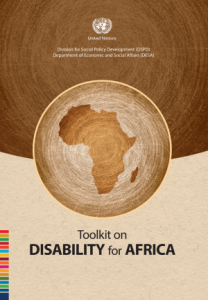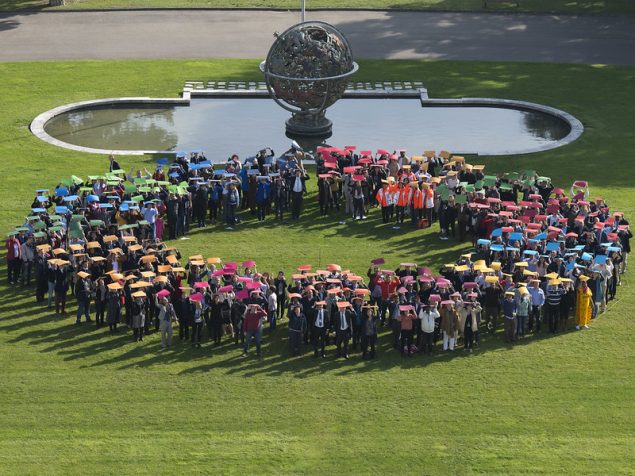A/RES/63/150
18 December 2008
Original: English
United Nations
General Assembly
Sixty-third session
Third Committee
Agenda item 55 (e)
Social development: review and appraisal of the World
Programme of Action concerning Disabled Persons
Realizing the Millennium Development Goals for persons with disabilities through the implementation of the World Programme of Action concerning Disabled Persons and the Convention on the Rights of Persons with Disabilities
The General Assembly,
Recalling its previous resolutions concerning persons with disabilities, in particular resolution 62/127 of 18 December 2007, and resolution 62/170 of 18 December 2007,
Recognizing the important role of the World Programme of Action concerning Disabled Persons as a policy instrument and of the Standard Rules on the Equalization of Opportunities for Persons with Disabilities as an instrument in support of efforts for persons with disabilities, and the need to update those instruments in the light of the provisions of the Convention on the Rights of Persons with Disabilities,
Welcoming the entry into force, on 3 May 2008, of the Convention on the Rights of Persons with Disabilities and the optional protocol thereto, the purpose of which is to promote, protect and ensure the full and equal enjoyment of all human rights and fundamental freedoms by all persons with disabilities and to promote respect for their inherent dignity, and recognizing that the adoption of the Convention represents a crucial opportunity to consolidate disability-related activities within the United Nations system,
Bearing in mind that conditions of peace and security based on full respect for the purposes and principles contained in the Charter of the United Nations and observance of applicable human rights instruments are indispensable for the full protection of persons with disabilities, in particular during armed conflicts and foreign occupation,
Aware that there are at least 650 million persons with disabilities worldwide, of whom 80 per cent live in developing countries, and that the majority of persons with disabilities live in conditions of poverty, and in this regard recognizing the critical need to address the negative impact of poverty on persons with disabilities,
Underlining the importance of mobilizing resources at all levels for the successful implementation of the World Programme of Action concerning Disabled Persons and the Convention on the Rights of Persons with Disabilities, and recognizing the importance of international cooperation and its promotion in support of national efforts, in particular in developing countries,
Reaffirming the need to include and integrate the rights, well-being and perspective of persons with disabilities in development efforts at the national, regional and international levels, without which the internationally agreed development goals, in particular the Millennium Development Goals, will not be genuinely achieved, and in this regard stressing the need to build or strengthen the effectiveness of national and regional legislation, the domestic policy environment and development programmes affecting persons with disabilities,
1. Welcomes the report of the Secretary-General on the fifth quiquennial review and appraisal of the World Programme of Action concerning Disabled Persons, and his report on the status of the Convention on the Rights of Persons with Disabilities and the optional protocol thereto;
2. Expresses concern about the persistent gap between policy and practice regarding mainstreaming the perspective of persons with disabilities, including their rights and well-being, in the work of the United Nations in realizing the Millennium Development Goals;
3. Urges States to involve persons with disabilities on an equal basis with other persons in the formulation of strategies and plans, in particular those of most relevance to them;
4. Encourages States, in cooperation with, inter alia, intergovernmental and non-governmental organizations, as well as regional and international financial institutions and the private sector, as appropriate, to be guided in their work by the objectives of the United Nations instruments related to disability by, inter alia:
(a) Examining and ensuring that development strategies, policies and programmes aimed at implementing internationally agreed development goals, including the Millennium Development Goals, are inclusive of issues concerning persons with disabilities and that they promote the equalization of opportunities for all;
(b) Ensuring accessibility and reasonable accommodation to enable persons with disabilities to realize their right to live independently and participate fully in all aspects of life, as well as to be agents and beneficiaries of development;
(c) Providing appropriate resources and accessible services and safety nets for persons with disabilities to ensure improved well-being for all;
(d) Ensuring an adequate standard of living and social protection for persons with disabilities, including through equal access to poverty and hunger eradication programmes, inclusive quality education, in particular free and compulsory primary education and progressive introduction of free secondary education, as well as the same range, quality and standard of free or affordable health care in order to ensure the highest attainable standard of health for persons with disabilities, without discrimination on the basis of disability, and access to full and productive employment and decent work for all;
(e) Promoting and strengthening national capacities for participatory, democratic and accountable processes and mechanisms that further the equalization of opportunities for the full and effective participation of persons with disabilities in civil, political, economic, social and cultural life;
5. Encourages States to collect and analyse appropriate information, including statistical and research data that are disaggregated by age and sex, on the situation of persons with disabilities, bearing in mind appropriate protection of personal data, for purposes of policy planning, analysis and evaluation that include the perspective of persons with disabilities, and in this regard invites States to avail themselves of the technical services of the Statistics Division of the Department of Economic and Social Affairs of the Secretariat;
6. Reaffirms the role of the United Nations Voluntary Fund on Disability and encourages States, intergovernmental organizations, concerned non-governmental organizations and the private sector to continue to support the Fund, with a view to strengthening its capacity to support catalytic and innovative activities to implement fully the development goals and objectives of the World Programme of Action concerning Disabled Persons,1 the Standard Rules on the Equalization of Opportunities for Persons with Disabilities2 and the Convention on the Rights of Persons with Disabilities,3 including the work of the Special Rapporteur, and to facilitate international cooperation, including building national capacities with emphasis on priorities for action identified in the present resolution;
7. Calls upon States to consider including in country reports in connection with the forthcoming periodic reviews of progress in achieving the Millennium Development Goals, a review and evaluation of the impact of development efforts on the rights, well-being and livelihood of persons with disabilities;
8. Urges States to pay special attention to the gender and age-specific needs of persons with disabilities, including by taking measures to ensure their full and effective enjoyment of all human rights and fundamental freedoms;
9. Also urges States to take, in accordance with their obligations under international law, including international humanitarian law and international human rights law, all necessary measures to ensure the protection and safety of persons with disabilities in situations of risk, including situations of armed conflict, humanitarian emergencies and the occurrence of natural disasters;
10. Recognizes the evolution of thought and discourse surrounding disability issues and the importance of aligning terminologies, definitions and models with the Convention on the Rights of Persons with Disabilities, and requests the Secretary-General to update the World Programme of Action in this regard, while maintaining its thrust and objective of addressing disability issues in the context of economic and social development;
11. Requests the Secretary-General to give higher priority to the concerns of and issues related to persons with disabilities and their inclusion within the work programme of the United Nations system, and, within existing resources, to strengthen the role of the United Nations and its development programmes and agencies in mainstreaming disability issues, in promoting the rights and well-being of persons with disabilities and in taking into account the perspective and inclusion of persons with disabilities in the work of the United Nations system through:
(a) Promoting the inclusion of the perspective of persons with disabilities into the policies, programmes and projects of the United Nations Secretariat and the other United Nations bodies and agencies on a broader scale and with higher priority, based on a holistic approach in the work done in the fields of social development, human rights and non-discrimination, and in this regard ensuring that the 2010 World Programme on Population and Housing Censuses is inclusive of the perspective of persons with disabilities;
(b) Further strengthening action in all countries and providing assistance to developing countries, in particular to least developed countries, with special attention to persons with disabilities in vulnerable circumstances;
(c) Assisting Member States in formulating comprehensive and coherent policies and action plans, as well as projects, including pilot projects that promote, inter alia, international cooperation and technical assistance, in particular to enhance the capacities of government agencies, as well as civil society, including organizations of persons with disabilities to implement programmes on disability;
12. Encourages States in their efforts to realize the Millennium Development Goals to recognize the importance of international cooperation and its promotion in support of national efforts for the realization of the purpose and objectives of the World Programme of Action and the Convention on the Rights of Persons with Disabilities, and to undertake appropriate and effective measures in this regard between and among States and, as appropriate, in partnership with relevant international and regional organizations and civil society, in particular organizations of persons with disabilities;
13. Requests the Secretary-General:
(a) To submit to the General Assembly at its sixty-fourth session a report on the situation of persons with disabilities with respect to the realization of all the Millennium Development Goals and on lessons learned and synergies and complementarities achieved, based on the implementation of the World Programme of Action, the Standard Rules and the Convention on the Rights of Persons with Disabilities, in order to provide a framework for Member States in their efforts to achieve the internationally agreed development goals for persons with disabilities;
(b) To present to the General Assembly at its sixty-fifth session a comprehensive biennial report on the implementation of the World Programme of Action, progress and challenges concerning the advancement of persons with disabilities in the context of development and the realization of the Millennium Development Goals;
(c) To request the Inter-Agency Support Group for the Convention on the Rights of Persons with Disabilities to integrate the rights of persons with disabilities into United Nations development activities and to provide guidelines for United Nations country teams.
———————————————————
1. A/37/351/Add.1 and Corr.1, annex, sect.VIII, recommendation I (IV)
2. Resolution 48/96, annex.
3. Resolution 61/106, annex I.
4.Ibid, annex II.




